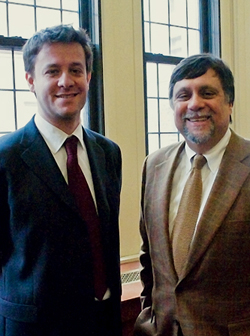New Colloquium Series Examines The Relationship of Mind and Body to Health, Education, and Society
In a colloquium at the Gottesman Libraries on January 20, Andrea Danese, MD, PhD, Assistant professor in the Department of Child and Adolescent Psychiatry at the Institute of Psychiatry, King’s College, London, summarized the interdisciplinary work which he and other researchers have done in this area.
Danese’s talk, “Biological Embedding of Adverse Childhood Experiences,” inaugurated the Health, Behavior, and Society Colloquium Series spearheaded by John Allegrante, Professor of Health Education and Deputy Provost. Sponsored and funded by the Office of the Provost, the colloquium series brings together faculty and students from across the College and other units of Columbia University whose research interests include the biological, behavioral and social bases of healthy human development and health-related education, behavioral, and social intervention.
“Our intent with this colloquium series is to catalyze interdisciplinary interest in what takes place at the intersection of genes, behavior and social circumstances, which we now know interact to affect health,” Allegrante says. “Our focus will be on work that seeks to illuminate the complexities of this interaction that promises to unlock mysteries that have eluded our understanding of how we can promote health over the lifespan.”
Scientists believe that enduring stress in childhood, for example, might elevate a critical protein marker for inflammation that could cause physiological disease later in life, Danese said. He is working with the SoBio Group at Teachers College led by research professor Inga Dora Sigfusdottir and Allegrante, which is now developing a longitudinal “epigenetic” study of Icelandic children – that is one that looks at environmental mechanisms that can alter gene expression.
At the second colloquium in the series, on February 17, “Discovering Depression Endophenotypes in Cardiovascular Disease,” Karina Davidson, Professor of Medicine and Psychiatry at the Columbia College of Physicians and Surgeons, discussed recent research suggesting that patients who are newly depressed following a cardiac event are 17 percent more likely to die within four years than cardiac patients who are not depressed. They also tend to die sooner than those who were chronically depressed prior to the attack.
Scientists are trying now to determine whether newly-depressed heart patients die more frequently because they are unable to make the recommended lifestyle changes, such as diet and exercise, which can hasten recovery and sustain their health. They hypothesize that depression following a cardiac incident does not cause behaviors that increase the risk of another, possibly fatal, episode. Rather, depression and behaviors are both prior predictors of cardiovascular disease, Davidson said. But they know that about a third of elevated risk levels for death can be attributed to inflammation, Davidson said, causing them now to test whether treating the inflammation can lower the risk of death.
Four more colloquia have been scheduled in the series:
March 24 – Sundar Natarajan, MD, New York University School of Medicine and Veterans Affairs New York Harbor Healthcare System
March 31 –
Ruth Watson Lubic, CNM, EdD, FAAN, FACNM (TC alumna, MacArthur fellow, and member
of the Institute of Medicine), Developing Families Center, Washington, DC. “Setting Health Care in its Social Context”
April 7 – Gary Belkin, MD, MPH, New York University School of Medicine and Program in Global Mental Health
April 21 – Gbenga Ogedegbe, MD, MS, New York University School of Medicine and Center for Healthful Behavior Change
Published Tuesday, Mar. 22, 2011
